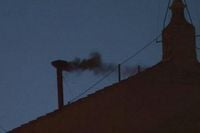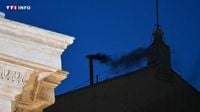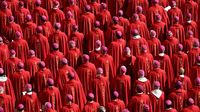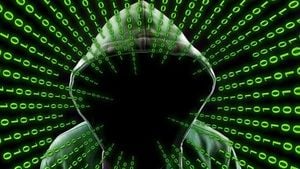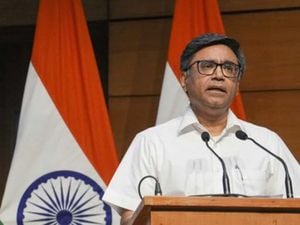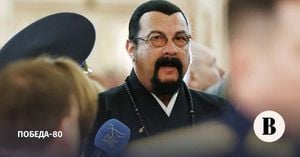The world is watching as 133 cardinals gather in the Vatican to elect a new pope following the death of Pope Francis. The conclave commenced on Wednesday, May 7, 2025, at 5:00 PM local time, with the cardinals entering the Sistine Chapel after a solemn mass in St. Peter's Basilica. They swore an oath of discretion, marking the beginning of a secretive and historic process.
As the cardinals took their places in the chapel, the atmosphere was charged with anticipation. The cardinal protodiacon, Dominique Mamberti, a 73-year-old French cardinal, will pronounce the famous "Habemus papam" once a new pope is elected. Mamberti, known for his extensive diplomatic experience, has been a key figure in the Vatican's international relations.
After the initial vote, black smoke billowed from the chimney atop the Sistine Chapel at 9:00 PM, signaling that no consensus had been reached on a successor to lead the Catholic Church, which boasts 1.4 billion members worldwide. With no candidate securing the necessary two-thirds majority—89 votes—the cardinals will reconvene for further voting on Thursday morning, May 8, 2025.
The conclave, which has attracted significant global attention, is the most diverse in history, with cardinals from 70 countries participating. This diversity reflects Pope Francis's legacy, as he appointed 108 of the 133 cardinals, many of whom come from regions previously underrepresented in the Church's hierarchy.
The decision to include younger cardinals from the Global South has introduced an element of unpredictability into the process. Cardinal Mario Zenari, the Vatican's ambassador to Syria, remarked, "Wait and see, a little patience, wait and see," acknowledging the challenges the cardinals face in reaching a decision.
The cardinals are isolated from the outside world during the conclave, with their phones confiscated and communications jammed to ensure secrecy. Each cardinal writes their choice on a ballot inscribed with the phrase "Eligo in Summum Pontificem"—"I elect as sovereign pontiff"—before placing it in an urn. The ballots are burned after each round of voting, producing either black smoke, indicating no election, or white smoke, which announces the election of a new pope.
As the cardinals engage in this sacred duty, the broader challenges facing the Church loom large. The new pope will need to navigate the legacy of Pope Francis, who championed progressive causes such as environmentalism, LGBTQ+ acceptance, and women's rights, while also addressing the ongoing sexual abuse scandals that have plagued the Church.
Potential candidates for the papacy are already being discussed, with names like Cardinal Luis Tagle from the Philippines and Cardinal Peter Erdo from Hungary emerging as frontrunners. Tagle, 67, is seen as a possible first Asian pope, while Erdo, 72, represents the more conservative faction within the Church.
Outside the Vatican, thousands of faithful gathered in St. Peter's Square, anxiously awaiting news of the new pope. Many expressed their hopes for a leader who would continue the progressive legacy of Pope Francis. "I hope the cardinals choose someone capable of making peace and unifying the Church," said Gabriel Capry, a 27-year-old from London.
Despite the excitement, some onlookers expressed frustration at the drawn-out process. "I knew it would take time, but I didn't expect to be waiting this long," lamented a young French woman who had been waiting for over two hours.
Historically, the conclave has been a secretive affair. Before 1274, the pope was elected by the local community, and the current process is designed to maintain absolute confidentiality. Any breach of this secrecy can lead to excommunication, a testament to the seriousness with which the Church handles this sacred tradition.
The Vatican has also taken steps to ensure security during the conclave. The Italian government has mobilized civil protection services to assist with logistics and safety, a necessary precaution given the large crowds expected in Rome. In 2005, the election of Pope Benedict XVI incurred costs of around 7 million euros, and similar expenses are anticipated for this conclave.
As the cardinals prepare for their next round of voting, the world holds its breath, eager to see who will emerge as the new leader of the Catholic Church. The conclave is not just a pivotal moment for the Church but also for the millions of Catholics around the globe who look to the pope for guidance and leadership in an increasingly complex world.
With the next vote scheduled for Thursday morning, the anticipation continues to build. Will the next smoke signal be white, heralding the arrival of a new pope, or will the cardinals need to deliberate further? Only time will tell as the conclave unfolds in the heart of the Vatican.
